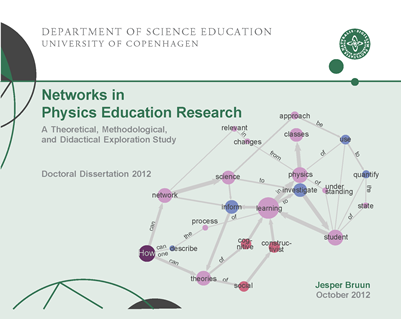Nr.28/2012 Networks in Physics Education Research - A Theoretical, Methodological, and Didactical Exploration Study
Summary
This thesis is about using complex networks to examine how physics students learn physics. It is an interdisciplinary and highly exploratory project between physics and science education, which results in a dissertation containing elements from network physics as well as constructivist learning theories. The premise of the thesis is that networks offer a way of quantifying learning situations, which can contribute to an understanding of what learning in physics entails. The thesis consists of a synopsis and four articles.
- The synopsis develops the theoretical foundation for linking learning theory with network theory.
- The first article describes a method to develop a network-based method that can capture socio-cultural aspects of learning.
- The second article is a network theoretical article, which examines how first-year university physics majors organize themselves into groups.
- The third article shows how network theoretical measures can be used to predict future grades of university students. Revised and published in Physical Review Special Topics - Physics Education Research. DOI: 10.1103/PhysRevSTPER.9.020109
- The fourth article argues that mental structures used to structure physics academic thinking can be captured by networks of words that students use to describe how a physical system works.
Author: Jesper Bruun, Department of Science Education, University of Copenhagen
IND's skriftserie no. 28/2012
Download pdf version
Networks in Physics Education Research - A Theoretical, Methodological, and Didactical Exploration Study [17 MB, pdf]

